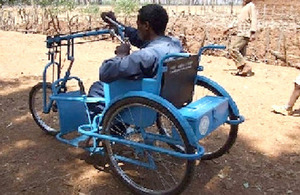DFID Research: Children's views of health in their communities
Young Lives children hosted a photo exhibition in Addis Ababa for the Day of the African Child.

Wheelchair. Picture: child participant, Young Lives/PhotoVoice
As part of its 15-year study of childhood poverty, Young Lives is working with children in Ethiopia to understand their views of health in their communities and how it affects their lives.
Children’s input and participation are central to Young Lives. Recently, they have been working with children in 2 regions of Ethiopia (Oromiya and the Southern Nations, Nationalities, and People’s Region) to encourage them to express their values and experiences through photos and discussion. By reflecting on the pictures and their messages researchers are learning more about the reality of children’s lives, ensuring that the research is set in a relevant and child-focused context.
Young Lives staff ran workshops with the children to provide basic photography training and facilitate child-led discussions of health in their communities. The children then went out to take pictures of subjects and situations they perceived as good or bad for people’s health. They shared these photos and explained the reasons behind each. A final selection of images was chosen based on what was most important to the children, and these were printed with captions and displayed in the communities. The exhibition gave the children the opportunity to present their pictures and to explain what was behind them to family, friends and other community members.
After these community workshops the children were invited to present their photos at an exhibition hosted by Young Lives in Addis Ababa in June 2008. National policy-makers and NGO representatives were invited to view, listen and discuss the photos and to build their insights into children’s daily lives, their preoccupations, hopes and aspirations. The children enjoyed presenting their photos and the audience showed real interest in their perspectives and their proposed solutions to their concerns.
The photos show that children have a good understanding of what they need to do in order to be as healthy as possible, and they illustrate some of the everyday health hazards they face. They show situations where children perceive poor health conditions and also depict good practices that children would like to see more of in their communities. The images reveal particularly that children:
- know how important clean water and sanitation is for health and personal hygiene
- care very much that all members of their family remain healthy and well cared for
- understand issues of safety, that some areas are dangerous or unhealthy to play in, or that some jobs are hazardous and care must be taken
- are aware of the importance of treating wounds to prevent infection, and cleanliness as an integral part of health
- appreciate the importance of good health services, but acknowledge that they are often far away from the childrens homes.
Young Lives are now working to ensure that the momentum built by the children is not lost. Exhibitions at various events in Ethiopia and the UK aim to communicate the captured views to wider audiences (notably at a UNICEF event celebrating the Day of the African Child in Addis Ababa on 16 June 2008). And they are combining information from the photos and their accompanying notes with descriptive analysis from a Young Lives quantitative questionnaire on health infrastructure and health problems in those communities. Outputs from this are expected by the end of 2008.
More information
R4D project record for the latest phase of the Young Lives project